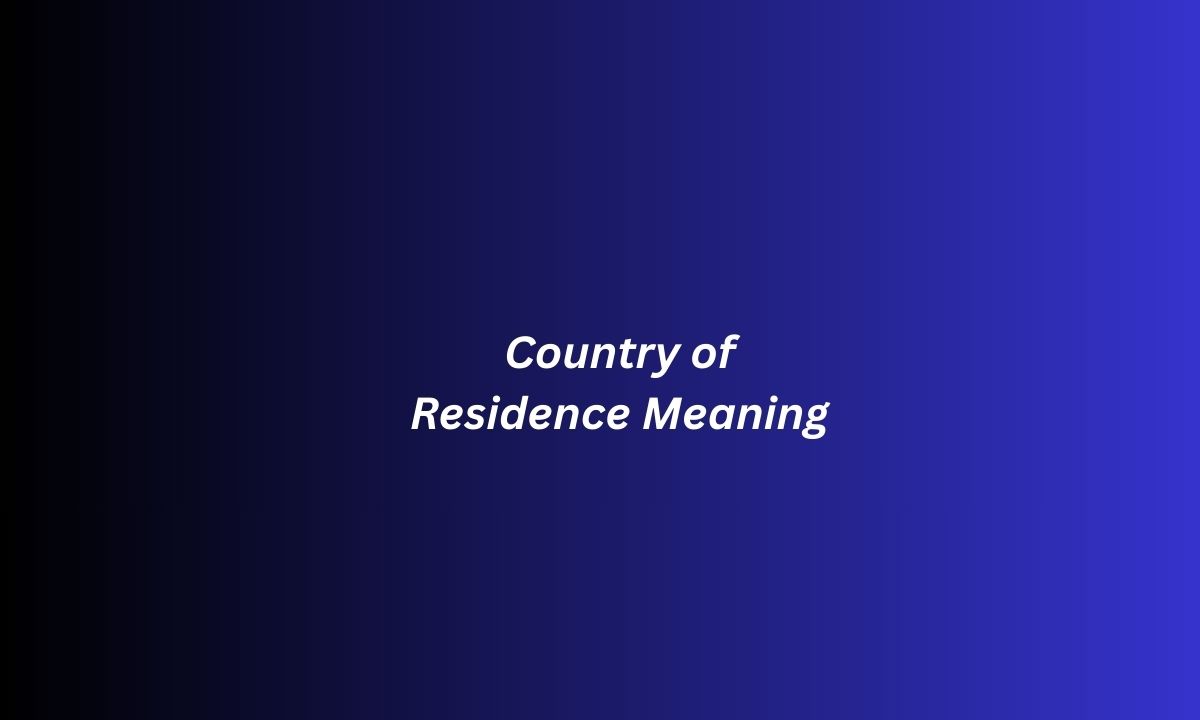The phrase country of residence meaning often comes up in formal documents, immigration processes, and even everyday communication. Understanding its correct usage ensures clarity and prevents misunderstandings, especially in legal, professional, or travel-related contexts where precision is essential.
Language learners and even fluent speakers sometimes confuse country of residence with country of origin or citizenship. Each of these terms has its own implication, but focusing on the meaning of country of residence provides a clear foundation for accurate communication.
This article explores the definition of country of residence, its application in different settings, and its nuances. It also examines polite, professional, and casual alternatives for expressing similar concepts, offering examples and explanations to guide you in choosing the most appropriate phrasing.
Country of Residence Meaning
The term country of residence refers to the nation where a person lives for an extended period, regardless of nationality or citizenship. It is not necessarily the country where someone was born but the country in which they spend most of their life at present.
For instance, if a person was born in Pakistan but currently lives and works in Canada for several years, their country of residence is Canada. The term is used in forms, contracts, surveys, and official statements to identify the individual’s current place of habitual living.
This meaning is important in banking, taxation, visa applications, and employment. Authorities often rely on the declared country of residence to determine eligibility, legal obligations, or benefits. It highlights where a person is settled at the moment, not their ancestral or citizenship ties.
Why Understanding “Country of Residence Meaning” Matters
Grasping the exact country of residence meaning is vital because mistakes can lead to serious consequences. In legal contexts, declaring the wrong country of residence might affect tax responsibilities or compliance with immigration regulations.
Professionally, organizations require accurate information to comply with international laws. For example, banks ask clients about their country of residence to adhere to global financial regulations. Employers also consider it while processing visas and contracts.
On a personal level, individuals filling out travel documents, school applications, or healthcare forms must understand and correctly state their country of residence. Knowing this term enhances confidence in dealing with administrative paperwork.
The Nuances of “Hiatus” in Relation to Expression
The user request connected the explanation with “hiatus meaning.” In language, a hiatus represents a pause or break, often in speech or time. When applied to phrasing like country of residence, it can help illustrate subtle shifts in meaning depending on tone or context.
Alternatives to a phrase such as “country of residence” may reflect a hiatus in formality. For example, in casual speech, someone may simply say, “Where do you live?” In contrast, a professional document must specify country of residence.
Thus, exploring the “hiatus” or transition between casual, professional, and polite alternatives provides depth to language learning. This helps readers adapt their communication style appropriately for different settings.
Alternatives to the Phrase “Country of Residence”
Sometimes, repeating the exact phrase country of residence can sound overly formal or technical. Depending on the situation, you may prefer more natural or polite expressions. Below are 15 well-structured examples, categorized by tone.
Polite Alternatives
- “Where are you currently residing?” – A respectful and formal way of asking without sounding too technical.
- “Could you share your place of residence?” – Polite and professional, often used in official correspondence.
- “May I know where you’re living at the moment?” – Gentle and considerate in tone.
- “What is your present residence?” – Slightly formal, suitable for administrative purposes.
- “Which country do you reside in?” – Direct yet courteous.
Professional Alternatives
- “Please indicate your country of residence.” – Standard in forms and documents.
- “Kindly state your current place of residence.” – Professional and suitable for workplace or legal contexts.
- “Provide the nation where you are habitually resident.” – Common in legal and financial documents.
- “What jurisdiction is your residence under?” – Technical, used in tax and compliance contexts.
- “Confirm your present country of settlement.” – Neutral and professional.
Casual Alternatives
- “Where do you live?” – The simplest, everyday way of asking.
- “Which country are you living in now?” – Friendly and straightforward.
- “Where’s home for you these days?” – Informal and conversational.
- “So, where are you based right now?” – Common in casual workplace talk.
- “Which place do you call home?” – Relaxed, warm, and personal.
Choosing the Best Alternative Based on Context
The right phrase depends on the level of formality required. For official documents, always stick to precise terms such as country of residence or place of residence. These leave no room for ambiguity and align with legal expectations.
In professional interactions, especially workplace discussions or emails, polite forms like “Kindly state your country of residence” or “Please indicate your current place of residence” maintain courtesy while ensuring clarity.
For casual conversations, friends, or informal meetings, options like “Where do you live?” or “Which country are you living in now?” are natural and easily understood. Adapting language ensures effective communication across varying tones and relationships.
How Tone Influences Meaning
Tone deeply impacts how phrases like country of residence are interpreted. A neutral, formal tone communicates professionalism, while casual alternatives build connection and comfort.
For example, asking “What jurisdiction is your residence under?” might sound intimidating to a layperson, while “Where do you live?” feels welcoming. Selecting tone-appropriate language helps avoid sounding impolite or overly formal in social settings.
When in doubt, consider the audience, purpose, and setting. Precision matters in legal documents, while warmth and simplicity matter in everyday interactions.
Common Mistakes with the Phrase
- Confusing “country of residence” with “country of origin.” The origin is where someone was born; residence is where they currently live.
- Equating residence with citizenship. A person may live in one country but hold citizenship in another.
- Using overly casual alternatives in professional forms. Substituting “Where’s home?” in a job application is inappropriate.
- Being too vague. Phrases like “I live around Europe” lack precision when a specific country is required.
- Misinterpreting temporary visits as residence. Short stays do not usually count as establishing residence.
Conclusion
The phrase country of residence meaning goes beyond a simple geographical reference; it carries legal, professional, and personal implications. Understanding its nuances ensures accuracy in documents, respect in communication, and adaptability across formal and casual contexts.
Exploring alternatives provides flexibility, allowing speakers and writers to tailor their language according to audience and purpose. From polite phrases like “May I know where you’re living at the moment?” to casual ones like “Where’s home for you these days?”, language adapts to relationships and settings.
By appreciating the tone, precision, and variations of this phrase, individuals enhance both clarity and professionalism in communication. Ultimately, mastering such expressions strengthens confidence in handling forms, discussions, and cross-cultural interactions effectively.

Elizabeth crafts heartfelt messages for every occasion—anniversary wishes, love notes, prayers, thank-yous, and inspirational greetings—bringing warmth, joy, and connection to your special moments.










